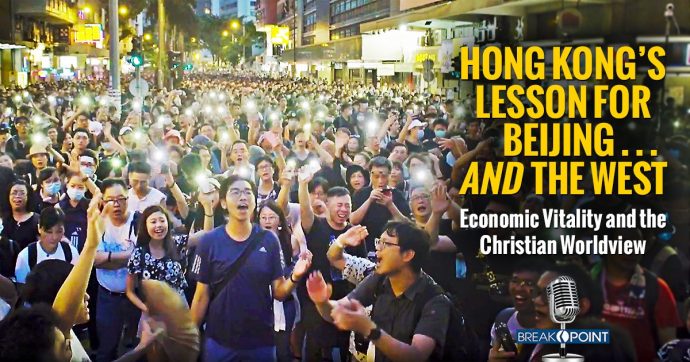John Stonestreet and Roberto Rivera’s article from yesterday highlighting the connection between economic vitality and the Christian worldview is a must read (or you can listen to it as well here). Years ago I compiled links under the heading On the Connection Between the Economic and Social Issues — this article deserves the top billing it now has on that page. Here are a couple of excerpts from the piece — bolding was added for emphasis:
Last week, the government of Hong Kong finally withdrew a proposed extradition law that sparked mass protests which have rocked the territory and rattled Beijing for weeks.
However, if Hong Kong’s Chief Executive Carrie Lam thought that withdrawing the extradition law would end the protests, she was mistaken. Over the weekend, demonstrators continued to rally, march, and wave the U.S. flag, while chanting “Resist Beijing, Liberate Hong Kong!” and—get this—“Pray for us, U.S., pray for us!”
Their chants highlight not only a Christian dimension in their protests, but the potential impact they believe Christianity can have on the Communist Party’s dictatorial rule, both in Hong Kong and throughout China.
. . .
In the midst of all this, Communist Party leaders know what many of the commentators and so-called experts in the West have long forgotten: That the ideas about justice and freedom that motivate many of the protesters in Hong Kong are rooted in Christianity.
How can we be sure Communist leaders know this? Because of a 2011 study by the state-run Chinese Academy of Social Sciences.
As one Academy member put it, “…we were asked to look into what accounted for the success, in fact, the pre-eminence of the West all over the world.”
After researchers studied everything from a “historical, political, economic, and cultural perspective,” they “realised that the heart of [the West’s] culture is [its] religion: Christianity . . . The Christian moral foundation of social and cultural life was what made possible the emergence of capitalism and then the successful transition to democratic politics.”
That’s quite a conclusion, to which an official of the Academy added, “We don’t have any doubt about this.”
. . .
The crackdown across mainland China and the attempts to control Hong Kong suggests the Chinese government wants what it cannot have: To enjoy Western creativity and economic vitality while simultaneously suppressing Christianity—the historical source of this Western creativity and vitality.
Read more: Breakpoint

